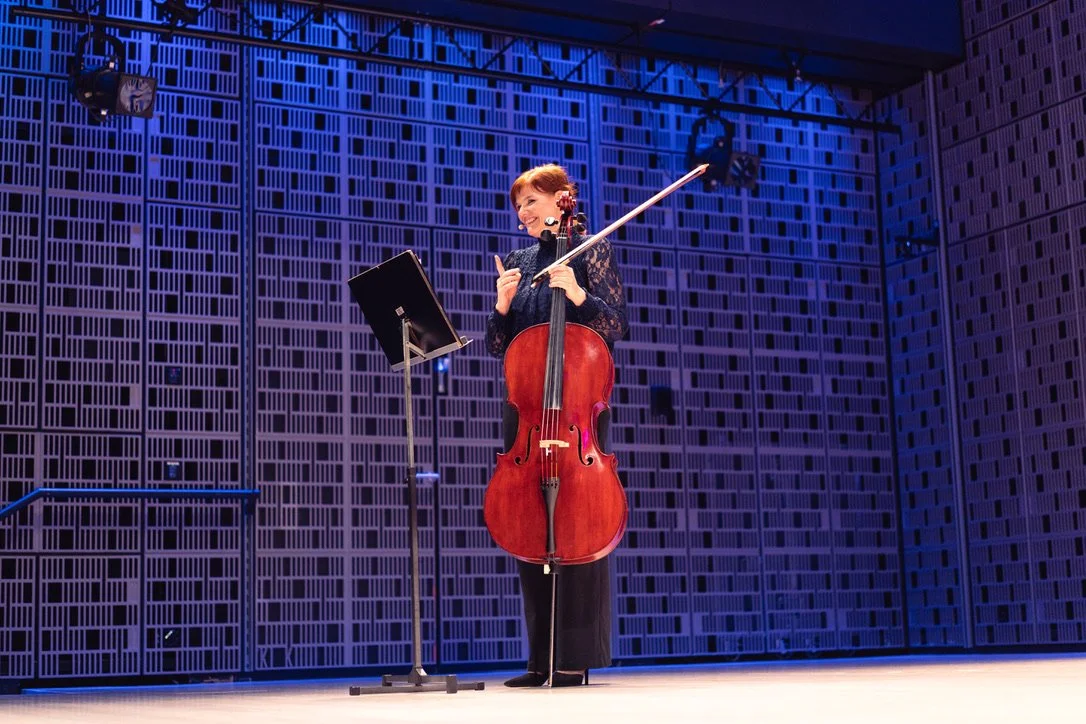list of publications
DMus thesis, Guildhall School of Music & Drama, 2022
Love at first sound: engaging with Western classical concert audiences through improvisation (2022) (pdf)
Click here for access in public domain
ABSTRACT
This artistic practice research project explores re-introducing improvisation to Western classical performance practice as a musician (cellist and ensemble partner/leader). Improvisation was part of concert culture and performers’ skill sets until early 20th century. Historical accounts as well as recent studies indicate that improvisatory elements in the program may contribute specifically towards the audiences’ experience of enhanced emotional engagement during the concert. The investigation follows four concert cycles of artistic practice of the researcher, who seeks to gain solo and chamber music improvisation techniques (both related to and independent of repertoire), conduct ensemble improvisation rehearsals, design concerts with an improvisatory approach and reflect on interactions with audiences after each concert. Data is collected through use of reflective diary, video recordings, measurement of sound parameters, questionnaires, a focus group, and interviews. The performer’s empirical experiences and findings from audience research components are reflected upon in an autoethnographic, narrative frame, and interrogated to better understand the (1) rehearsal and planning processes that enable improvisatory elements to return to Western classical concert experience and (2) the emotional experience and type of engagement that occur throughout the concert experience for both performer and audience members. This motivation informed the development of a concert model, in which the performer designs and presents a program of solo and chamber music repertoire and improvisations, as well as engages in spontaneous exchange with audience throughout the concert (including improvisations based on audience suggestions). In designing concerts, inspiration was drawn from historical concert culture, where elements of risk-taking, spontaneity and audience involvement (such as proposing themes for fantasies) were customary. The research identified features of ensemble improvisation, such as empathy, emergence, mutual engagement and collaborative creativity, that became mirrored in audience’s responses, generating higher levels of emotional engagement, empathy, inclusivity, and a participatory, co-creative experience. Similarly, the performer’s experience of highest risk-taking and moments of flow often corresponded with audience’s experience of most emotionally engaging moments of the concert, regardless of ensemble size, program, event, and audience. Examining interactions between all involved during the concert revealed that performer-audience impulse exchange occurred on multiple levels of awareness and seemed to build upon each other, resulting in particularly strong experiences of both performer and audience’s engagement.
conference presentation (2022)
Improvisation in Historical Styles: Research, Pedagogy and Performance
Examining the performer-audience impact of re-introducing stylistic solo & ensemble improvisation to Western classical concert programs
conference presentation (2022)
Improvisation in Historical Styles: Research, Pedagogy and Performance
This presentation and demonstrative performance arise from a project in which classical musicians sought to learn and re-integrate improvisation ability to their existing professional musicianship, and use it to interact with audiences. Inspired by historical classical concerts, where such elements were customary, the performance demonstrates a number of related processes, such as real-time problem solving, intuitive knowledge, risk-taking and spontaneous creativity - both with successful and unsuccessful outcomes. According to recent research (Haustein 2022), concert audiences appreciated musicians sharing their process of learning and engaging in live improvisation as part of the concert program, even before the musical product and skill sets had fully matured.
conference performance (l8nite, eparm 2021)
Engaging with Western classical concert audiences through improvisation
Demonstrating of outcomes rising from a series of four concerts and related audience research of my doctorate project on classical improvisation and audience engagement. In the first part of this performance, the audience hears a song, Mausfallensprüchlein, “The Mousers Magic Verses” by Hugo Wolf (1822, text by Eduard Mörike). As a way to illustrate the improvisatory approach, this song is turned into a series of songs by applying the structure of “theme and variations”. First performed as written, with original composition as “theme”, it is then improvised into a trio (first variation) and followed by subsequent improvised variations, in which the elements of the theme are developed further and further. This song is a whimsical little piece, composed to a children’s poem during Wolf’s early years, and we contribute to its character through imagining the various scenarios in which this comedic text can take place. In the second part of the performance, a group of chamber musicians present themselves as improvisors-for-hire and create short pieces according to themes and suggestions from audience members.
